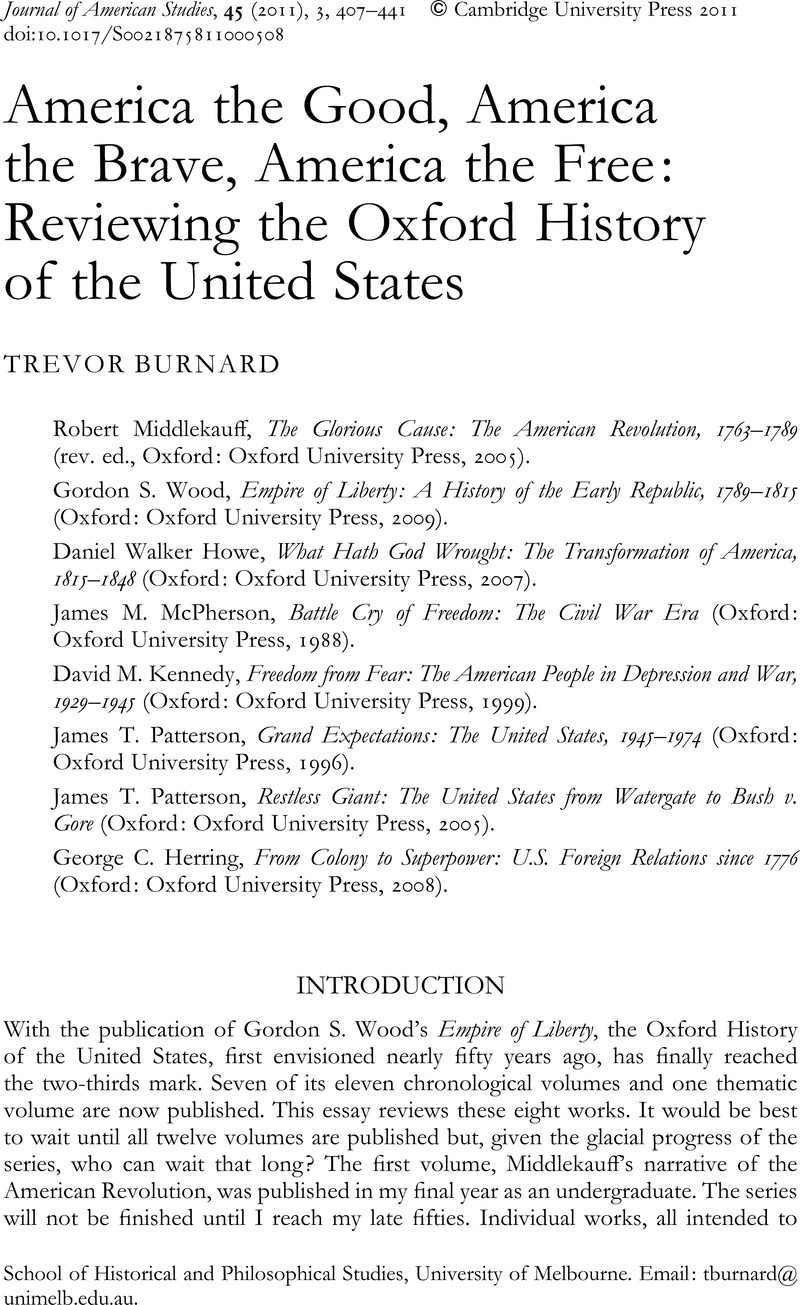No CrossRef data available.
Published online by Cambridge University Press: 09 August 2011

1 References to each volume will be by author followed by page number.
2 Gordon S. Wood, The Radicalism of the American Revolution (New York: Vintage, 1993).
3 The inattention given to great men in other fields, like literature, technology, business or science is lamentable. McPherson does not find space to mention Moby-Dick (1852); Kennedy only mentions F. Scott Fitzgerald and Ernest Hemingway in order to explain popular reactions to political events and does not mention William Faulkner or Ezra Pound at all. One could go on. The contrast with the New Oxford History of England is remarkable. Hoppen, for example, devotes a large section of his history of mid-nineteenth-century England to Charles Dickens, Anthony Trollope and Charles Darwin, apologizing for not treating properly the work of James Clerk Maxwell, the pioneering physicist. K. Theodore Hoppen, The Mid-Victorian Generation 1846–1886 (Oxford: Oxford University Press, 1998), 6.
4 Laurel Thatcher Ulrich, A Midwife's Tale: The Life of Martha Ballard Based on Her Diary, 1785–1812 (New York: Vintage, 1991).
5 See Victoria E. Bonnell and Lynn Hunt, eds., Beyond the Cultural Turn: New Directions in the Study of Society and Culture (Los Angeles and Berkeley: University of California Press, 1999).
6 Sean Wilentz, The Rise of American Democracy: Jefferson to Lincoln (New York: W. W. Norton & Co., 2005).
7 Boyd Hilton, A Mad, Bad, and Dangerous People? England 1783–1846 (Oxford: Oxford University Press, 2006).
8 For Woodward and his conservative turn from the mid-1960s, see Hackney, Sheldon, “C. Vann Woodward, Dissenter,” Historically Speaking, 10 (2009), 31–34CrossRefGoogle Scholar.
9 For a similar argument see Schwarz, Benjamin, “The Path of Least Resistance,” Atlantic Monthly, October 2006Google Scholar.
10 Robert Bartlett, England under the Norman and Angevin Kings 1075–1225 (Oxford: Oxford University Press, 2000), 686–92.
11 Lisa McGirr, Suburban Warriors: The Origins of the New American Right (Princeton: Princeton University Press, 2002).
12 Philip D. Morgan, Slave Counterpoint: Black Culture in the Eighteenth-Century Chesapeake and Low Country (Chapel Hill: University of North Carolina Press, 1998), 83.
13 Perry Miller, Errand into the Wilderness (Cambridge, MA: Harvard University Press, 1956). For an acute comment on how Wood follows the declension model in one of his previous books see Appleby, Joyce, “The Radical Recreation of the American Republic,” William and Mary Quarterly, 3rd ser., 51 (1994), 681Google Scholar. The comment also holds true for his work in this series.
14 Patterson makes a point of emphasizing Bush Sr.'s wartime service, counterposing it with Bill Clinton's failure to serve in Vietnam (Patterson, Restless Giant 218, 249).
15 No one born between 1924 and 1946 (22 years) became US President. The next-longest span of years in which no one was born who became President was between 1809 and 1822 (13 years).
16 Edmund S. Morgan, American Slavery, American Freedom: The Ordeal of Colonial Virginia (New York: W. W. Norton, 1975), 387.